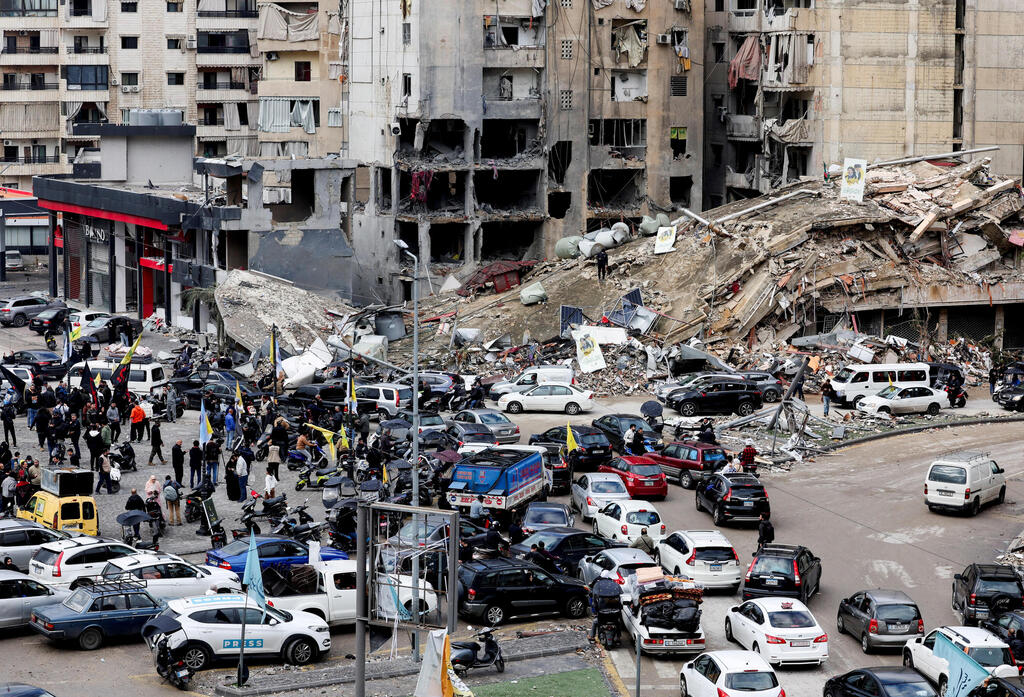Getting your Trinity Audio player ready...
This time around, Hezbollah is in no position to claim they’ve “captured the flag.” While it’s possible that a spokesperson for the organization might step forward with bold-faced lies about a supposed victory, the reality is clear to most Lebanese citizens – whether Shiite, Sunni, or from other communities – that Hezbollah suffered a devastating defeat in the recent conflict.
IDF attacking inside Lebanon before ceasefire goes into effect
(Video: IDF Spokesperson's Unit)
This loss goes beyond the elimination of key figures, including Hassan Nasrallah, his deputy, and other senior members of Hezbollah’s Jihad Council. It also includes the highly effective “pager operation,” which, almost overnight, exposed Hezbollah’s vulnerabilities and left the organization weakened and exposed.
And the blows didn’t stop there. The Israeli Air Force dealt significant damage to Hezbollah’s stockpiles of both long-range and medium-range rockets, while Israeli intelligence demonstrated its ability to locate Hezbollah operatives down to the level of company commanders and higher, including those facilitating weapons smuggling from Iran through Syria. The list of successes is extensive, and the IDF’s Intelligence Directorate, which faced justified criticism for its failures leading up to October 7, deserves recognition for its brilliant performance in the Lebanese arena.
This campaign will undoubtedly be studied in military academies around the world as a model of how Israel, through a combination of deception, tactical ingenuity, precise intelligence, combat spirit and soldierly sacrifice, managed to bring the conflict to a decisive close once the decision was made to act.
This outcome raises important questions about Israel’s long-standing policy since 2006, upheld by successive governments – those of Olmert, Netanyahu, and Bennett-Lapid, that allowed Hezbollah to grow unchecked over the past 17 years without decisive action to stop its military buildup. While some operations were carried out in Syria, the fear of direct confrontation with Hezbollah led to paralysis, enabling the group’s dangerous ascension and bringing Israel to the brink of a security disaster.
Will Israel act decisively to prevent Hezbollah’s next military buildup, or will it hesitate, as it has over the past 17 years?
This was further exposed by Yahya Sinwar’s decision on October 7 to launch a war. Ultimately, as previously noted after Nasrallah’s elimination, it was Hamas and Sinwar who “killed” Hezbollah (and Nasrallah). Without the flames of the southern front, Israel might have woken up one day to face an even more dangerous threat than Hamas in the south. The tunnels, infrastructure and weaponry on the northern border all point to the extensive preparations Hezbollah and Iran had made for a confrontation with Israel – one that could have ended in a national catastrophe.
Criticism of the current agreement with Lebanon and Hezbollah is valid in principle. Once the cease-fire takes effect, Hezbollah will undoubtedly resume its reconstruction efforts, while Iran will likely attempt to funnel funds and weaponry to the group by any means possible. This raises a critical question: will Israel act decisively to prevent Hezbollah’s next military buildup, or will it hesitate, as it has over the past 17 years?
From Israel’s perspective, the agreement itself is pragmatic and achieves significant strategic goals that were once hard to imagine. First, it separates the northern front from Gaza. On this point, Hezbollah retreats under pressure, unable to maintain its linkage to Gaza. Second, Hezbollah’s expected withdrawal north of the Litani River will make it far more difficult for the group to surprise Israel or execute plans like “conquering the Galilee.” Hezbollah is now vulnerable, weakened and fragmented, and its recovery will take considerable time – although it will eventually recover if Israel allows it.
Get the Ynetnews app on your smartphone: Google Play: https://bit.ly/4eJ37pE | Apple App Store: https://bit.ly/3ZL7iNv
This agreement is far from ideal but represents the least harmful option under the circumstances and, in some respects, is even a reasonable one. It is also crucial to consider the human cost of both civilian and military lives. Calls for total destruction or forcing Hezbollah to surrender are detached from reality and risk dragging Israel into a prolonged and unwinnable quagmire. Nonetheless, Israel must maintain its freedom to act if Hezbollah attempts to rebuild its strength or move south of the Litani River.
The more urgent issue for Israel, beyond the return of hostages, remains not Gaza but Iran’s nuclear ambitions. While fighting in the south has slowed, Iran continues its relentless push toward a nuclear weapon. Although Israel may have damaged elements of Iran’s nuclear program through airstrikes, Tehran is certain to resume its efforts soon. In this context, if Iran succeeds in developing a nuclear bomb, Hezbollah’s strategic importance to Iran would diminish substantially. Iran has long relied on Hezbollah as a deterrent against Israeli strikes on its nuclear facilities. However, with a nuclear arsenal, Iran would no longer need Hezbollah to the same extent, and the organization’s role would be significantly reduced.








